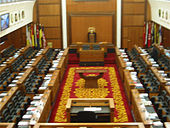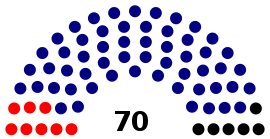- Dewan Negara
-
Senate
Dewan Negara
Type Type Upper house President of the Dewan Negara Abu Zahar Ujang, Barisan Nasional - UMNO
since April 26, 2010Structure Members 70 Senators 
Political groups (as of 21 April 2011)
BN (56)PR (8)Vacant (6)Meeting place Malaysian Houses of Parliament, Kuala Lumpur, Malaysia Website http://www.parlimen.gov.my/ Malaysia 
This article is part of the series:
Politics and government of
Malaysia
The Dewan Negara (Malay for Senate, literally National Hall) is the upper house of the Parliament of Malaysia. The Dewan Negara consists of 70 members, of which 26 are indirectly elected by the states, with two senators for every state in the Federation, and the other 44 being appointed by the Yang di-Pertuan Agong (King).
The Dewan Negara reviews legislation that has been passed by the lower house, the Dewan Rakyat; both meet at the Houses of Parliament in the capital city of Kuala Lumpur. Both houses must pass a bill before it can be sent to the King for royal assent; however, if the Dewan Negara rejects a bill, it can delay the bill's passage by only a year before it is sent to the King.
Originally, the Dewan Negara was meant to act as a check on the Dewan Rakyat and represent the interests of the various states. However, the original constitution, which provided for a majority of state-elected senators, has since been modified to make senators appointed by the King the majority.
Contents
Membership
Members of the Dewan Negara are referred to as "Ahli Dewan Negara" (literally "member of the Dewan Negara") in Malay and as "Senators" in English. The term of office is 3 years and senators may only be re-appointed once, consecutively or non-consecutively.
Each of the 13 state legislative assemblies chooses two senators. The King appoints two senators for the Federal Territory of Kuala Lumpur, and one respectively for the Federal Territories of Labuan and Putrajaya on the advice of the Prime Minister.
Another 40 senators, regardless of their states, are appointed by the King, also on the Prime Minister's advice.[1] Federally appointed senators must have "rendered distinguished public service or have achieved distinction in the professions, commerce, industry, agriculture, cultural activities or social service or are representative of racial minorities or are capable of representing the interests of aborigines (Orang Asli)".[2]
The intent of the original Constitution of Malaysia, which provided for only 16 Senators to be appointed by the King (thus placing them in the minority) was to give the states some say over federal policy. However, subsequent amendments have, according to former Lord President of the Federal Court Tun Mohamed Suffian Mohamed Hashim, acted "contrary to the spirit of the original constitution which established the Dewan Negara specially as a body to protect in the federal Parliament, state interests against federal encroachments".[3]
To qualify, a candidate must be a Malaysian citizen residing in the Federation, must not owe allegiance to any foreign state, must not have received a prison sentence of one year or longer, and must not have been fined RM2,000 or more. Holders of a full time profit-making position in the public service are also ineligible. There is no requirement to belong to a political party. Parliament is permitted to increase the number of Senators to three per state, reduce the number of appointed Senators, or abolish the post of appointed Senator altogether. The process of appointment is set out by Article 45 of the Constitution.[1] The Constitution provides for direct election of the 26 Senators from the states, but this clause does not take effect until Parliament passes a resolution bringing it into effect; as of 2010, the Senators remain indirectly elected.[4]
The Dewan Negara is not affected by the elections for the Dewan Rakyat, and senators continue to hold office despite the Dewan Rakyat's dissolution for an election.[2]
The Dewan Negara elects a President to preside over sittings of the Dewan Negara, ensure observance of the rules of the house, and interpret the Standing Orders of the house should they be disputed.[5] Should the President be absent, his Deputy takes his place.[6]
Powers and procedure
The Dewan Negara may initiate legislation, except for financial and fiscal matters — a regulation directly from the Westminster system. It may also amend legislation, provided it does not deal with financial matters. Any proposed legislation must first be passed by the Dewan Rakyat. Then it is presented to the Dewan Negara in three readings. At the first, the legislation's proposer presents it to the assembly. At the second, the bill is debated. At the third, a vote is taken whether to pass or reject the bill. The Dewan Negara may not formally reject bills; it is only allowed to delay their passage by one month, or up to a year under certain circumstances. After the bill has passed or the requisite period is up, the bill is presented to the King for royal assent. If the King demurs or 30 days pass without royal assent, the bill is sent back to Parliament with a list of suggested amendments. The bill must then be reapproved by both houses of Parliament. If the King still does not grant royal assent 30 days after it is presented to him again, the bill automatically becomes law. It does not take effect, however, until it is published in the Government Gazette.[7]
Although members of Parliament typically have legal immunity when it comes to freedom of discussion, under the Sedition Act, a gag rule forbids discussion about repealing certain articles of the Constitution dealing with controversial Bumiputra privileges such as Article 153.[8]
Current composition
Current composition of the Dewan Negara by political parties:[9][10]
Affiliation Elected by
state assembliesAppointed by
the KingTotal Seats Barisan Nasional: 18 38 56 United Malays National Organization (Pertubuhan Kebangsaan Melayu Bersatu, UMNO) 10 20 30 Malaysian Chinese Association (Persatuan Cina Malaysia, MCA) 5 5 10 Malaysian Indian Congress (Kongres India Se-Malaysia, MIC) 0 6 6 Malaysian People's Movement Party (Parti Gerakan Rakyat Malaysia, Gerakan) 0 2 2 United Traditional Bumiputera Party (Parti Pesaka Bumiputera Bersatu, PBB) 2 1 3 Sarawak United People's Party (Parti Rakyat Bersatu Sarawak, SUPP) 0 1 1 Sarawak Progressive Democratic Party (Parti Demokratik Progresif Sarawak, SPDP) 0 1 1 Sarawak People's Party (Parti Rakyat Sarawak, PRS) 0 1 1 United Pasokmomogun Kadazandusun Murut Organisation
(Pertubuhan Pasok Momogun Kadazandusun Bersatu, UPKO)1 0 1 People's Progressive Party (Parti Progresif Penduduk Malaysia, PPP) 0 1 1 Pakatan Rakyat: 8 0 8 People's Justice Party (Parti Keadilan Rakyat, PKR) 3 0 3 Islamic Party of Malaysia (Parti Islam SeMalaysia, PAS) 3 0 3 Democratic Action Party (Parti Tindakan Demokratik, DAP) 2 0 2 Overall total 26 38 64 There are currently six vacancies in the Dewan Negara.
Notes and references
- ^ a b Shuid, Mahdi & Yunus, Mohd. Fauzi (2001). Malaysian Studies, p. 33. Longman. ISBN 983-74-2024-3.
- ^ a b Henderson, John William, Vreeland, Nena, Dana, Glenn B., Hurwitz, Geoffrey B., Just, Peter, Moeller, Philip W. & Shinn, R.S. (1977). Area Handbook for Malaysia, p. 217. American University, Washington D.C., Foreign Area Studies. LCCN 771294.
- ^ Wu, Min Aun & Hickling, R. H. (2003). Hickling's Malaysian Public Law, pp. 26–27. Petaling Jaya: Pearson Malaysia. ISBN 983-74-2518-0.
- ^ Rachagan, S. Sothi (1993). Law and the Electoral Process in Malaysia, p. 8. Kuala Lumpur: University of Malaya Press. ISBN 967-9940-45-4.
- ^ "President". Retrieved Feb. 15, 2006.
- ^ "Deputy President". Retrieved Feb. 15, 2006.
- ^ Shuid & Yunus, p. 34.
- ^ Means, Gordon P. (1991). Malaysian Politics: The Second Generation, pp. 14, 15. Oxford University Press. ISBN 0-19-588988-6.
- ^ "Senarai Ahli Dewan Negara" (in Malay). Parliament of Malaysia. http://www.parlimen.gov.my/index.php?modload=ahlidewan&uweb=dn. Retrieved 2011-04-21.
- ^ "Statistik Dewan Negara" (in Malay). Parliament of Malaysia. http://www.parlimen.gov.my/pages.php?view=110&uweb=dn. Retrieved 2011-04-21.
Legislatures of Malaysia Parliament of Malaysia Dewan Rakyat · Dewan NegaraState Legislative Assemblies
(Dewan Undangan Negeri)Categories:- Parliament of Malaysia
- National upper houses
Wikimedia Foundation. 2010.
